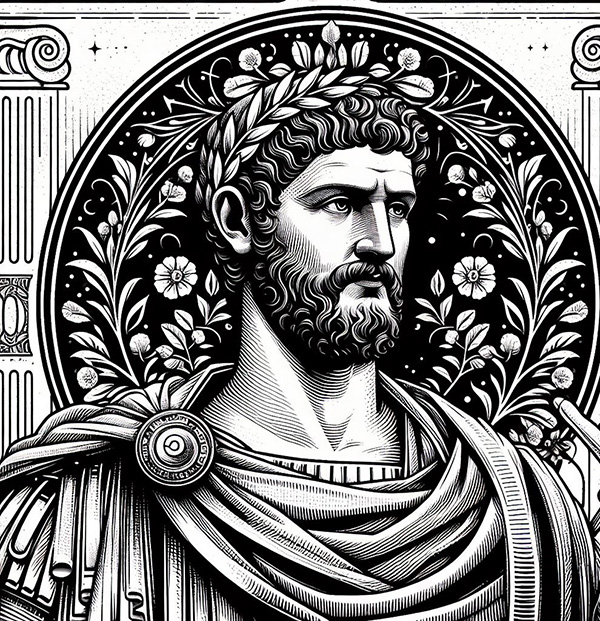
Early Life and Education: Marcus Aurelius was born into a prominent Roman family, which set the stage for his future as a leader. His early life was marked by a comprehensive education, where he was exposed to various schools of thought, but it was Stoicism that resonated with him deeply.
Reign as Emperor: Marcus Aurelius reigned from 161 to 180 CE and is celebrated for his contributions to Stoic philosophy and his virtuous rule during challenging times. His reign was characterized by a blend of intellectual pursuits and military challenges. Marcus ascended to the throne alongside his adoptive brother, Lucius Verus. The early years were marked by their joint rule, a novel approach to governance in the Roman Empire. His tenure was dominated by military conflicts, notably the Roman–Parthian War (161–166) and the Marcomannic Wars (166–180). These wars were significant not only for their scale but also for the strain they placed on the empire’s resources and stability. During his reign, the empire was also struck by the Antonine Plague, which had a profound impact on the Roman population and military, further complicating the empire’s challenges.
His death marked the end of the Pax Romana, a period of relative peace and stability for the Roman Empire. He was succeeded by his son Commodus, whose reign contrasted sharply with that of his father.
Stoic Philosophy: As a Stoic philosopher, Marcus Aurelius emphasized virtue, resilience, and acceptance of the natural order. His philosophy advocated for inner tranquility and personal growth, which he practiced throughout his life and reign.
Meditations: His most famous work, “Meditations,” is a collection of personal writings that encapsulate his Stoic beliefs. It offers insights into his thoughts on life, virtue, and wisdom, and remains a significant philosophical text that continues to inspire readers worldwide.
Philosophical Reign: Marcus Aurelius’ reign as emperor was heavily influenced by his Stoic philosophy. He is often considered the embodiment of Plato’s Philosopher King, governing according to philosophical precepts and higher truths.
Impact on His Time: His teachings on self-discipline and virtue provided guidance during turbulent times. His influence extended to prominent figures of his era.
Influence on Literature: His Stoic principles have inspired writers throughout history, including American writer Ambrose Bierce, known for his cynical and satirical works.
Enduring Legacy: Marcus Aurelius’ philosophy and leadership style have had a lasting impact on history, influencing not only the Roman culture of his time but also modern perspectives on leadership and personal development.
In summary, Marcus Aurelius’ reign was a complex tapestry of war, disease, and philosophy. His ability to maintain his composure and adhere to his Stoic principles amidst adversity has left a lasting impression on history, making him one of the most respected emperors of Rome. His “Meditations” continue to be a source of inspiration and guidance for many in the pursuit of a virtuous life.
